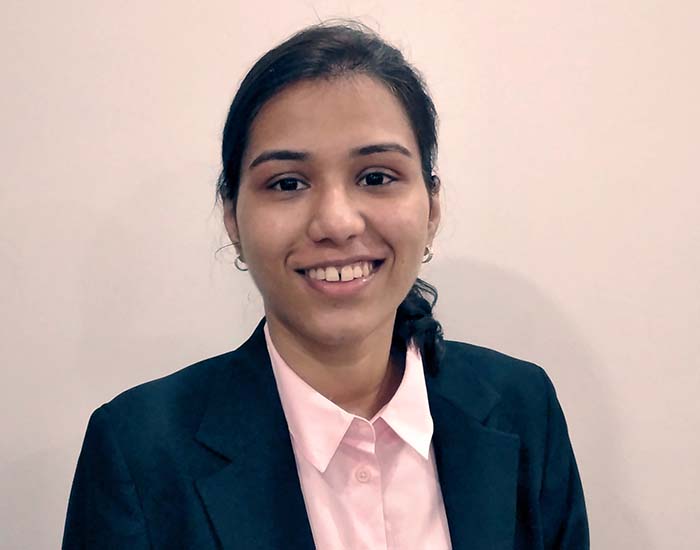Prior to enrolling in Keck Graduate Institute's (KGI) Master of Engineering in Biopharmaceutical Processing (MEng) program, Aishani Yadav, MEng ‘22, was already well-equipped for a successful career in biopharmaceutical processing. In addition to having a bachelor's in Zoology and a master's in Molecular Microbiology from the University of Delhi in India, she had more than two years of industry experience under her belt.
However, she still felt that she could explicitly use more formal education toward the biopharmaceutical processing industry.
"My degrees were in general science, so they didn't focus much on the engineering aspects of bioprocessing," Yadav said. "Unfortunately, we don't have many programs in India which integrate both these principles. The programs we do have are very competitive to get into because we have a huge population."
Thus, Yadav began searching abroad for relevant programs. She learned about KGI's MEng program through Biocon Academy, a program created in collaboration between KGI and Biocon, India's largest biopharmaceutical company.
This three-month program provides industry-oriented training programs to biotech students, leveraging Biocon's industry experience with KGI's subject expertise. The main goal is to bridge the gap between academic knowledge and its practical application in industry scenarios. This was crucial for Yadav, who was looking to transition from a purely academic environment to an industry-oriented one.
As a result of her participation in Biocon Academy, Yadav landed a job at Dr. Reddy's Laboratories in the biopharmaceutical industry, where she worked for nearly three years before enrolling at KGI. As a Production Specialist in Manufacturing Biologics (Upstream), her responsibilities included:
- Managing small-scale culture activities according to production plan.
- Ensuring compliance in Documentation and Manufacturing Practices.
- Troubleshooting bioreactor problems.
"I learned a lot, and I think that experience has also helped me in my graduate studies because I can contribute and understand more," Yadav said. "Now I know what I have to focus on."
However, her transition to KGI has not been without its challenges. As an international student, she had difficulty obtaining her Visa, though she was able to get it on an emergency basis by the end of the year.
Additionally, the pandemic made it difficult for her to adjust to life in a new country and a new field of study.
"The entire education for my first semester was online, so I missed a lot of lab classes along with interactions with classmates that you typically get in a campus environment," Yadav said. "However, things have improved greatly since I've come here."
Yadav is looking forward to having in-person classes in fall 2021. Additionally, she has appreciated the support of her program director Dr. Sue Behrens and faculty advisors—particularly Dr. Hu Zhang, Dr. Saurav Datta, Dr. James Sterling, and Dr. Michael Koeris.
"Dr. Koeris has just joined KGI as a faculty member, but so far from my experience, all of them have been accommodating and responsive to student queries and doubts," Yadav said. "All my classmates and PhD scholars have also been very helpful."
One highlight of her first year was the Team Master's Project, where she learned how to use computational fluid dynamics for bioreactor characterization.
"We used simulation techniques and software to characterize parameters for a bioreactor, which is something I hadn't done before," Yadav said. "One thing that I have enjoyed is learning new techniques and tools to perform calculations more efficiently. Professor Sterling introduced me to software called Mathcad. All of these online tools have opened my horizons."
Sterling appreciates Yadav's willingness to learn new skills.
"It was a real pleasure teaching Aishani this past academic year," Sterling said. "I taught some challenging bioprocess engineering coursework, and she was a member of an advanced Team Masters Project that I co-advised as well. I was impressed with how she mastered the work even though we were teaching online during the COVID-19 pandemic, and she was in India for much of the time."
Another challenge that Yadav has successfully navigated has been adjusting to American culture.
"Indian culture is much different from American culture, but it's been a good learning experience," Yadav said. "One positive quality I've noticed about American culture is that people are confident about their abilities, and they go for what they want instead of just blindly following everyone else."
Her long-term goal is to work for the Indian biopharmaceutical industry. She is leaning towards Upstream as she already has experience in that area but is also open to exploring new areas, including Downstream and the business side of the industry. She will be taking some business courses for the upcoming semester, including one in supply chain management and biotech operations.
For the moment, though, Yadav is taking the opportunity to explore Southern California, including such highlights as the Santa Monica pier, the Natural History Museum, and the Claremont Botanical Gardens.
"So far I've had a great time at KGI as well as the Biocon Academy," Yadav said. "I credit the people who came up with the idea to introduce that program in India. It has opened many avenues for other people and me to enter bioprocessing degree programs in India and here in the U.S. It's an excellent institute, and I'm grateful that Biocon Academy and KGI accepted me into their programs."
